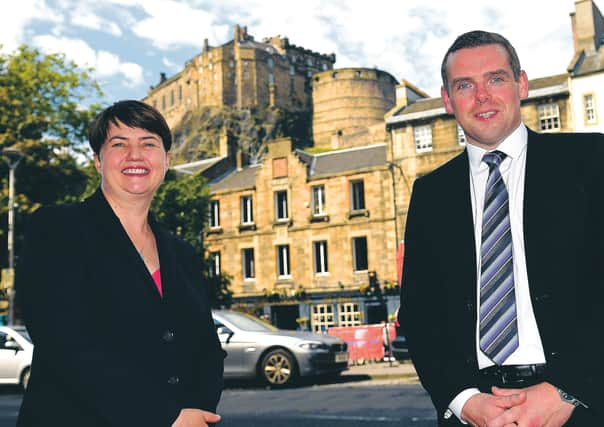Presentation is key to beating the SNP - Adam Tomkins


Scotland has the third worst record in Europe when it comes to managing the Coronavirus, yet the party of government in Scotland, the SNP, continues to ride sky high in the opinion polls. Mood amongst the Nationalists is buoyant. They believe that independence is so close to being within reach they can almost smell it.
Those of us who continue to believe that Scotland’s best future lies within the United Kingdom and not separate from it have got some hard truths to face up to. Unless we are honest about both what the Nationalists are getting right and what we are getting wrong, we have no chance of turning the tide, no matter how many leadership changes we impose on ourselves.
Advertisement
Hide AdAdvertisement
Hide AdThe first truth is to understand why, despite their woeful record of delivery on the ground, the SNP are still sky high in the polls. It’s all about the optics. Readers of this newspaper may be an exception, but most voters do not consume their politics at a very deep level. Most voters skate on the surface, leaving all that inconvenient nitty-gritty detail to their elected representatives. Successful political leaders get this. In crude electoral terms policy only rarely matters and, even then, it matters only when it goes wrong. What matters electorally is presentation. Appearance trumps reality.
The reality is that the Scottish Government has done no better than the UK Government at managing the Coronavirus crisis—in terms of excess mortality, deaths in care homes, and economic devastation things are every bit as bad here as they are in England and Wales. But the perception is otherwise. Unionists (and, in particular, Conservatives) who don’t understand how we cannot “land” our attack lines on the SNP’s record in government fail to grasp this. We may wish it were otherwise, but the truth is you are never going to get anywhere banging on about the substance unless you have the presentation right.
Never is this more clearly the case than in times of crisis. In March we all did an extraordinary job of scaring the hell out of people. Lockdown worked not because the law made it a criminal offence to leave one’s home without reasonable excuse, but because people did not want to leave their homes. They were scared.
In times of fear people want to be led. They want clear, calm, authoritative leadership. I’m going to be honest about this—I found this shocking. I am a liberal to my core—it’s why I am a Conservative. I believe in individual freedom and responsibility. I don’t want to live in a society where the criminal law makes it an offence to go outside without permission. I want to live in a society where people make their own responsible and informed decisions about what is safe and appropriate, and what is unsafe and inappropriate, in a time of pandemic. But I know I’m in a minority. Most people do not think that way. Most people want clear rules, clearly and calmly explained, by a person in authority whom they trust.
We know that Nationalist and Unionist is a deep division in modern Scottish life. But Coronavirus has taught us that there is an even more profound one—libertarian and authoritarian.
In managing the Coronavirus crisis, even though the substance of their decisions has been remarkably similar, the way in which the Scottish and UK Governments presented those decisions to the public has been divergent in the extreme. No leader in Europe more fully embodies the liberal approach to governing a crisis than Boris Johnson. And few leaders in the world more fully embody the authoritarian approach than Nicola Sturgeon. That is why the Prime Minister changed the “stay home” message to “stay alert”. And it is why the First Minister castigated and pilloried him for it. Boris believes that Covid is best managed by people staying alert and making their own responsible decisions; Nicola believes that that is nonsense. For her, it is clear government direction that will conquer Covid, not individual choice and responsibility.
For a few weeks in the spring I thought that Coronavirus might be such a big event that it would finally drag Scotland out of the Nationalist v Unionist rut in which our politics has been stuck for a decade. That was a naïve hope. As our sunny spring gave way to another grey summer the old familiar politics began to reassert itself amid the new normal. It is depressing—but true—that Coronavirus has been reduced in Scottish politics to a battle between Boris and Nicola.
Perhaps this was inevitable. Crises of all descriptions push governments and leaders centre stage. Power shifts from parliaments to governments as emergency laws confer huge and unprecedented powers on ministers. MPs and MSPs struggle to hold ministers to account, and opposition leaders struggle for air time.
Advertisement
Hide AdAdvertisement
Hide AdWhere does this leave us? The future is notoriously hard to predict but, if the past is any guide, the lesson is this. Throughout the 20th century support for independence went up in times of economic prosperity and down in times of uncertainty. Why? Because, for all of that time, the UK was seen by the majority of Scots as a safe haven, as a port in a storm. That is the hard-won reputation for the United Kingdom which Unionists have to secure. We will not be able to secure it by banging on only about the substance and the reality of the extraordinary financial support Rishi Sunak and the Treasury have provided. We will be able to secure it only if we get the presentation right, too. It is not enough for the Union merely to be that safe haven. It has to look and act and feel like one as well.
Adam Tomkins is Scottish Conservative MSP for Glasgow region
Comments
Want to join the conversation? Please or to comment on this article.